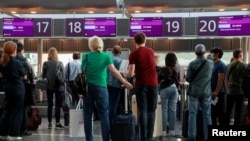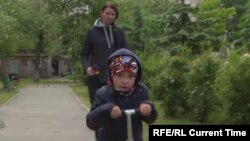Four-year-old Ukrainian Zakhar Shklyar had been waiting two years for a kidney transplant in Belarus when Ukraine’s May 26 decision to sever air links with its northern neighbor put that wait indefinitely on hold.
Now, with no immediate prospect for the restoration of these flights, his mother, Kateryna Shklvar, worries that her son may be unable to receive an operation in time should a suitable kidney become available. “We’re fighting so much for this; just for the child to hold on until this transplant,” Shklyar said.
The Shklyars’ dilemma is not unique: Three hundred and forty-two Ukrainians currently are awaiting organ transplants in Belarus -- more than a sixfold increase since 2020, according to the Ukrainian Health Ministry.
Over the past decade, as its medical tourism industry has thrived, Belarus has become a regional leader for organ transplants. In 2020, it ranked 15th in the world for total donations of organs (201) from deceased donors, according to the World Health Organization. Kidney transplants, such as Zakhar Shklyar requires, accounted for over 69 percent of the 463 organ transplants Belarus performed in 2020, the non-governmental International Registry in Organ Donation and Transplantation (IRODat) reports.
Often touted for their relative affordability compared with the European Union or United States, Belarusian transplants range from around $40,000 for a kidney transplant to $132,000 for a liver transplant, according to the Ukrainian Association of Medical Tourism, which promotes transplants in Belarus.
Ukraine’s state budget covers these costs for Ukrainian citizens – a critical role in a country with an average Gross Domestic Product per capita of just $3,659 per year.
But using this policy in Belarus now poses a problem. Ukraine closed its airspace to Belarus and Belarusian airline Belavia after the May 23 diversion of a Ryanair plane to Minsk, and Belarusian police’s subsequent detention of two of its passengers, opposition activist-journalist Raman Pratasevich and his girlfriend, university student Sofia Sapega.
Belarus plans to appeal the decision to the International Civil Aviation Organization, a United Nations agency that sets regulations for global passenger flights.
On June 4, though, the European Union also closed its airports and airspace to Belarusian flights -- a move that further restricts reaching Minsk from Kyiv.
With the COVID-19 pandemic having halted Belarus-Ukraine passenger trains, that means that motor vehicles are the only remaining viable option for travel between the two states.
Yet traveling by car is not realistic for all Ukrainian transplant patients. Minsk is a minimum eight-hour drive from Kyiv, but kidney-transplant-candidate Zakhar Shklyar complains of nausea within half an hour, his mother says.
Belarusian doctors, though, require a blood test every three months so that a good match with a kidney donor can be found.
For 55-year-old kidney-transplant-candidate Larisa Raskevich, a resident of the southern Ukrainian city of Kherson, distance is even more of an obstacle. It would take her four days to reach Belarus by ground transportation from Kherson, she claimed in a May 30 YouTube video of Ukrainian transplant patients who want Kyiv to restore its air links with Belarus.
Donated kidneys require transplantation within 36 hours, according to the Donor Alliance, a U.S. non-profit that works with organ and tissue donation.
But the Ukrainian Health Ministry does not intend to initiate any campaign to lift the flight ban for transplant patients to reach Belarus more promptly, commented Vasyl Strelka, head of the ministry’s Directorate for Hi-Tech Medical Care and Innovation.
“This isn’t a critical situation because last year and in past years, people basically got there by car,” Strelka said. “Unfortunately, it’s not like there’s a large quantity of people who go for transplants” in Belarus, he added.
Instead, Strelka proposed that prospective transplant patients have their operations done in Ukraine. The week of May 31, a man who had been waiting for a kidney transplant in Belarus had the operation done in the western Ukrainian city of Lviv, the official said.
Rather than paying out potentially millions of dollars abroad for transplants on Ukrainians, Ukraine wants to concentrate on developing its own transplant services.
In January, then Health Minister Maksym Stepanov announced plans to make organ transplants “a completely standard type of medical care that Ukrainians can receive in their country."
Compared with 2019, Ukraine this year more than quadrupled its spending on a pilot project to meet that goal to 502 million hryvnia (over $18.42 million), the Ukrainian news site Ukrinform reported.
The number of Ukrainian medical and research facilities participating in the project doubled to 38 in 2020, the outlet added.
But Ukraine’s activity remains comparatively limited. In 2020, it performed 131 transplants with donated organs from deceased and living donors, according to IRODat.
For those Ukrainian transplant patients still determined to proceed to Belarus, Strelka suggested flying to Minsk from Kyiv with a layover, but the costs are substantial: Flights from Kyiv to Minsk now primarily require travel via Istanbul, Turkey on Turkish Airlines – at best, a 10-hour flight for just over $900.
Direct flights no longer exist between Ukraine and Russia, the region’s most active transplant hub, based on IRODat statistics.
So far, the website for Belarus’ state-run Republican Scientific and Practical Center for Organ and Tissue Transplantation, which oversees its transplants, contains no advisories for patients now unable to reach Belarus.
Yet even once in Belarus, Ukrainian transplant patients’ challenges are not over.
Liver-transplant patient Anya, from eastern Ukraine’s Kharkiv region, found herself stranded in Minsk when Kyiv canceled flights to and from Belarus. She had already completed post-transplant therapy, but was not physically able to return home in a regular car.
“I'm wearing a bandage that holds my stomach in place and that holds the whole scar [for the liver transplant]; the scar starts from my chest and runs all the way down to the bottom [of my torso], and then almost to my armpit,” she commented.
To transport her, the Ukrainian government sent an ambulance to drive Anya back to Kharkiv – a 21-hour trip that she partly completed prone.
Three more such trips are planned the week of June 7, 2021, according to the Ukrainian Foreign Affairs Ministry.
Ukraine’s ambassador to Belarus, Ihor Kizim, however, identified moving near the two countries’ 1,084-kilomers-long (674-mile-long) border as “the best solution” for Ukrainians who know they may receive a transplant in Belarus within a month.
That way, Ambassador Kizim theorized, they could reach the hospital “with their own transportation.”
But though Belarus has transplant facilities and coordination centers in the western city of Brest and the eastern city of Homel, not far from the Ukrainian border, Minsk still provides the most options, according to a 2018 map from the Republican Scientific and Practical Center for Organ and Tissue Transplantation.
That brings the problem back to time. Worried Kherson transplant candidate Raskevich, “You can’t wait for a patient for a long time.”








